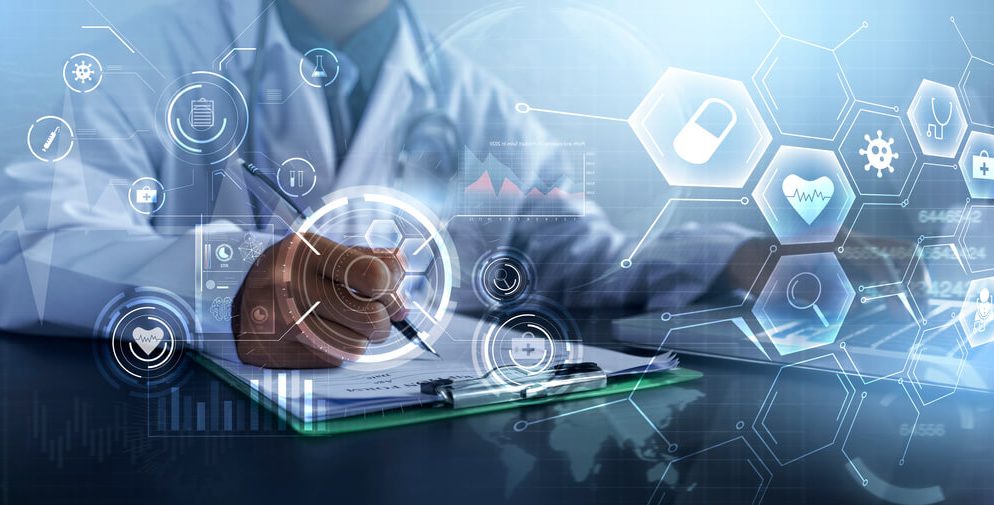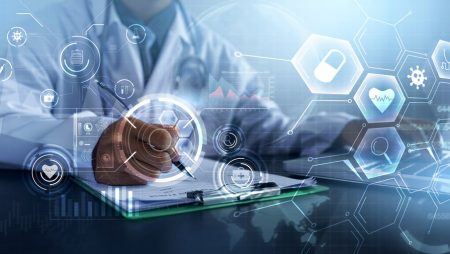



Get new exclusive access to healthcare business reports & breaking news




Self-driving cars, robots, smart homes, and intuitive wearable devices are the typical innovations people associate with artificial intelligence (AI). These examples are just part of the tip of the proverbial iceberg. And, if you go a bit deeper, you’ll find how AI and its subdivisions, like machine learning, are making waves in many industries, including healthcare.
Key factors, like the influx of large and complex datasets, declining costs of hardware, a surge in needing improvised healthcare, and a growing need to reduce healthcare costs, among others, are driving the global demand for AI in the healthcare industry. Much so that the projected growth of USD 64.7 billion by 2027 enticed more tech companies to join pharmaceutical and other healthcare companies in looking for ways to push past the limits of AI to meet the growing demands.
The abundance of benefits from technology is genuinely fascinating, and for those who’d like to know more about the overarching effects of AI, here’s how machine learning is revolutionizing the healthcare industry:
Managing health records can be exhausting. Shorter timelines combined with a dizzying volume of data can be overwhelming for healthcare practitioners who are responsible for recording notes and analyzing medical records.
Physicians are said to lose 34 to 55 % of their time just by managing their patients’ medical records. The loss of productivity is one of the leading reasons workflow automation by way of machine language is continuously being improved.
To ensure that the development of processes doesn’t affect the everyday operations of healthcare providers and experts, software development companies can leverage off-the-shelf solutions, some of which you can check out if you click here, to meet the demands without prolonged downtime.
Since healthcare data are utterly sensitive and may influence life-changing procedures, it’s of utmost importance to keep any kind of disruption to their workflow at a minimum.
Another excellent example of how machine learning revolutionizes the healthcare industry is improving the identification and diagnosis of diseases. Artificial intelligence (AI) helps medical experts streamline the process of assessing the risk of patients through the analysis of their medical history, symptoms, and family history.
An example of this can be developments in tomosynthesis, a type of digital procedure that uses low-dose x-ray to create a two-dimensional (2D) or three-dimensional (3D) image of the breast. Developments in tomosynthesis show better breast cancer detection with fewer false-positive findings compared to digital mammography. This improvement is incredibly beneficial in identifying a tumor in the early stages, especially in women of color who have denser breast tissues.
Another improvement society can benefit from incorporating machine learning in healthcare is accessibility. Not everyone can afford to see medical specialists for diagnosis and treatments; hence, people who face more medical challenges due to nutrition insecurity and economic instability rarely see the medical care they need.
An example of how AI can impact healthcare accessibility is through the use of telemedicine. Since mobile phones are now ubiquitous, people from rural areas or those who come from the middle and lower classes are given the opportunity to get themselves diagnosed through their mobile phones.
One of the ways machine learning revolutionizes the healthcare industry is through the advancement of drug discovery and manufacturing. Advanced technologies with AI can help make processes more cost-effective and faster in drug discovery projects. Pharmaceutical companies can maximize their data instead of sticking to a tedious and expensive trial-and-error approach during their research and manufacturing.
An excellent example of how machine learning techniques in research and development (R&D) can significantly contribute to healthcare is through the discovery of alternative paths for the treatment of multifactorial diseases through next-generation sequencing and precision medicine.
Precision medication is another way machine learning is revolutionizing the healthcare industry. Healthcare professionals can leverage the vast volume of information collected by allowing AI systems to go through them to formulate the precise medication they’ll dispense to a patient.
Prescription systems incorporated with machine learning go through a patient’s medical history, behavior, and characteristics to draw insightful predictions and conclusions that’ll determine if a particular patient will take a particular medication.
Other benefits of using AI in research and manufacturing also include optimizing clinical trials to maximize efficiency in simulating large amounts of data to facilitate trial protocol developments up to its successful completion.
Incorporating machine learning in pharmaceutical research decreases spending and shortens the turnaround time. Instead of spending billions of dollars to support a lengthy research project, pharmaceutical companies can save more money because clinical trials are now shorter with the help of artificial intelligence research platforms.
Another way AIs are changing the healthcare industry is through virtual assistance in health monitoring. With the emergence of wearable technology, smart mobile phones, and discrete monitors combined with advanced AI technology and the powerful Internet of things (IoT), patients are now empowered to monitor their health.
Since these gadgets continually check vitals and collect data, it’s become easy for medical experts to make recommendations based on the data gathered by these consumer-oriented devices. Data availability can help healthcare professionals get accurate information about their patients’ health.
Although healthcare technology has gotten better through the years, it’s still safe to say that machines won’t replace healthcare experts, at least in the near future. Empathy, ingenuity, and persuasion are human factors that AIs would have a hard time replicating.
Keep in mind that machine learning is just a means to achieve more efficient and less expensive healthcare services that are accessible to more people. With more companies joining in the race to develop the most cutting-edge tools and systems, it’s safe to forecast that there may be hope for more inclusive healthcare very soon. And, in order to succeed in satisfying the needs of stakeholders and patients, it’s vital for life scientists, physicians, healthcare providers, and AI engineers to closely collaborate in order to succeed in revolutionizing the healthcare industry.